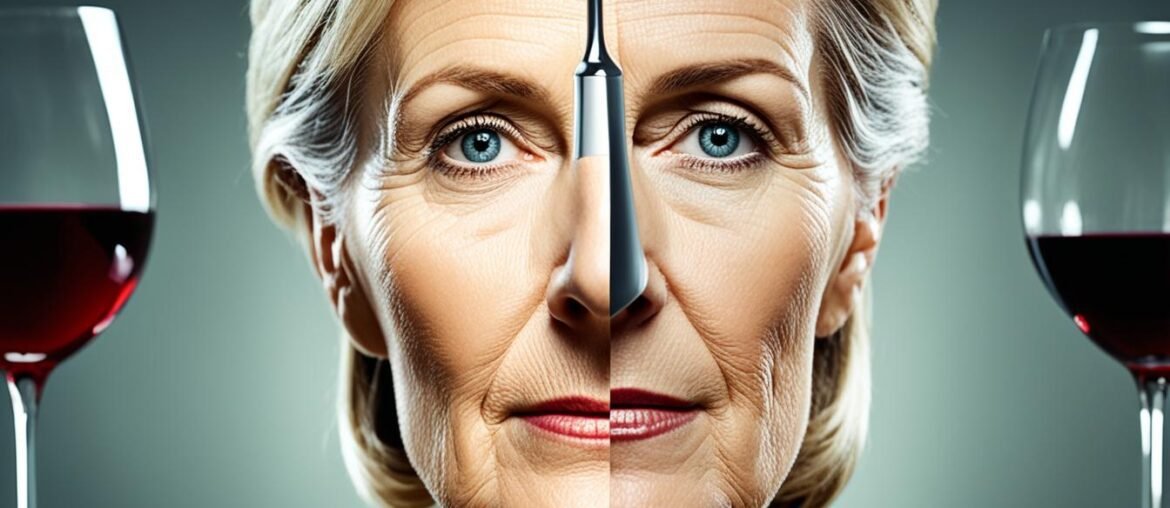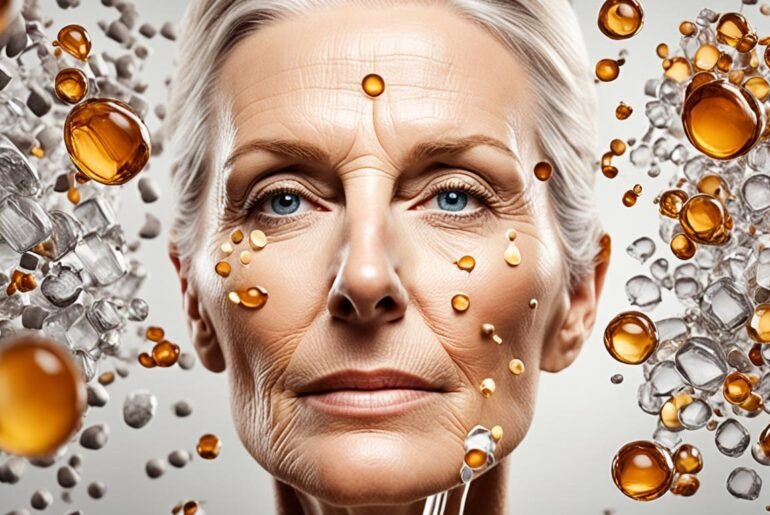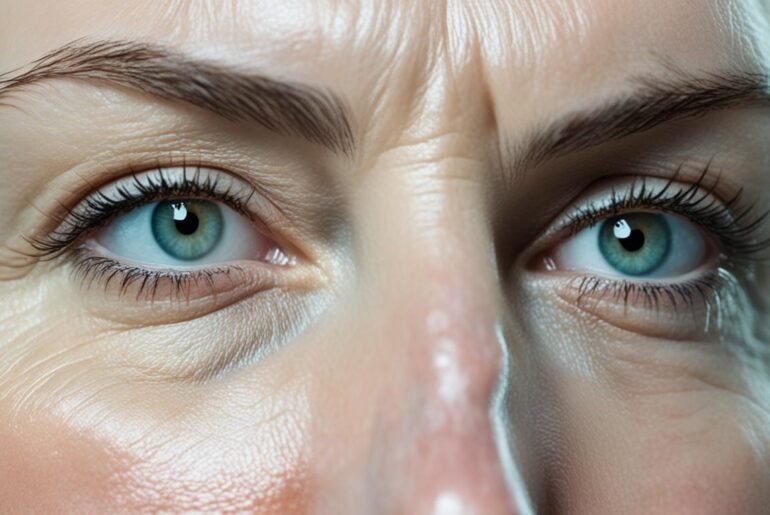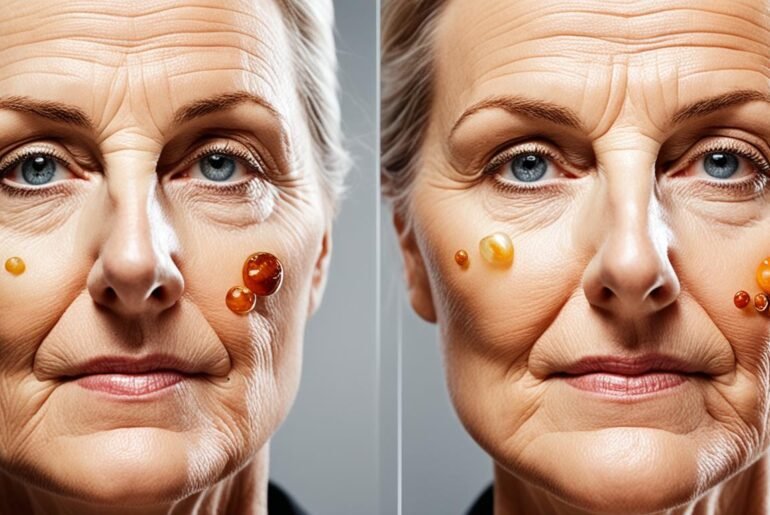Did you know that heavy alcohol use is associated with increased severity of facial aging? That’s right, your favorite glass of wine or cocktail could be aging your skin faster than you think. In this article, we will explore the effects of alcohol on the skin and how it can contribute to premature aging. From wrinkles and sagging skin to dehydration and inflammation, alcohol’s impact on antiaging skincare is significant. But don’t worry, I will also provide you with tips on how to prevent premature aging and maintain youthful, healthy skin.
Key Takeaways:
- Heavy alcohol use is associated with increased severity of facial aging.
- Alcohol can cause dehydration and lead to dryness and wrinkles.
- It induces inflammation, resulting in redness and flushing of the skin.
- Alcohol can accelerate collagen degradation, leading to sagging skin and wrinkles.
- Practicing moderation and adopting a healthy lifestyle can help prevent premature aging.
The Effects of Alcohol on the Skin
Alcohol can have significant negative effects on the skin, leading to various issues such as dehydration, inflammation, and accelerated aging. Understanding these effects is crucial for maintaining healthy and youthful skin.
Dehydration
One of the primary effects of alcohol on the skin is dehydration. Alcohol inhibits the absorption of water into the cells, resulting in dryness and increased water loss. This leads to the appearance of fine lines, wrinkles, and a dull complexion.
Inflammation
Alcohol-induced inflammation is another common consequence of excessive alcohol consumption. This inflammation can manifest as redness, flushing, and sensitivity in the skin. Over time, persistent inflammation can contribute to the development of wrinkles and other signs of premature aging.
Skin Aging
Alcohol consumption can accelerate the aging process of the skin. The dehydration and inflammation caused by alcohol, along with other factors such as collagen degradation, can lead to the formation of wrinkles, sagging skin, and loss of elasticity.
To visually illustrate the effects of alcohol on the skin, consider the following table:
| Effect | Description |
|---|---|
| Dehydration | Alcohol inhibits water absorption, leading to dryness and increased water loss. |
| Inflammation | Excessive alcohol consumption can cause skin redness, flushing, and sensitivity. |
| Skin Aging | Alcohol accelerates the aging process, contributing to the formation of wrinkles and sagging skin. |
It is important to note that the effects of alcohol on the skin may vary depending on factors such as the amount and frequency of alcohol consumption, overall skincare routine, and individual genetic predispositions. However, minimizing alcohol intake and adopting a balanced skincare regimen can help mitigate these effects and promote healthier skin.
Dehydration and Skin Aging

Dehydration is a common effect of alcohol consumption and can have a significant impact on the skin. When the body lacks sufficient water, the skin becomes dry, dull, and more prone to wrinkles and sagging. Alcohol-induced dehydration exacerbates these effects and can contribute to premature skin aging.
Staying hydrated is crucial for maintaining the skin’s health and youthful appearance. By drinking plenty of water, we can replenish moisture levels and help the skin retain its natural elasticity and firmness. Minimizing alcohol intake is also essential, as it further dehydrates the body and increases the risk of accelerated skin aging.
Remember, our skin is the largest organ in our bodies, and it requires proper hydration to function optimally. Dehydration not only affects the skin’s appearance but can also impair its ability to perform vital functions such as regulating body temperature and protecting against environmental factors.
Effects of Dehydration on the Skin
Dehydration leads to a variety of skin problems and accelerates the aging process. Here are some of the effects of dehydration on the skin:
- Dryness and tightness: When the skin lacks moisture, it becomes dry, flaky, and tight.
- Wrinkles and fine lines: Dehydrated skin is more prone to developing wrinkles and fine lines, making us appear older than we actually are.
- Sagging and loss of elasticity: Inadequate hydration weakens the skin’s supportive structures, leading to sagging and a loss of elasticity.
- Dullness and lackluster complexion: Dehydrated skin lacks the natural radiance and glow, resulting in a dull, tired-looking complexion.
- Increased sensitivity: Dehydration compromises the skin’s barrier function, making it more susceptible to irritation and sensitivity.
By prioritizing hydration and minimizing alcohol-induced dehydration, we can help preserve the skin’s health and delay the signs of aging. It’s recommended to drink at least eight glasses of water daily and limit alcohol consumption to maintain a hydrated and youthful complexion.
Inflammation and Skin Aging
Alcohol-induced inflammation can have detrimental effects on the skin. When the skin is inflamed, it appears red and flushed, and over time, this persistent inflammation can lead to visible signs of aging such as wrinkles and sagging. The histamine reaction caused by alcohol contributes to the redness and flushing of the skin. Minimizing alcohol consumption can help reduce inflammation and preserve the skin’s youthful appearance.
Inflammation plays a crucial role in the aging process of the skin. It is a response triggered by the body’s immune system to protect against harmful stimuli such as infections and injuries. However, chronic inflammation can have negative consequences on skin health, accelerating the aging process.
The sequel follows that alcohol-induced inflammation can exacerbate these effects, leading to premature skin aging. Inflammation caused by alcohol consumption can disrupt the balance of collagen and elastin production, two essential proteins that maintain the skin’s elasticity and smoothness. This imbalance can result in the breakdown of collagen and elastin fibers, leading to the appearance of wrinkles, fine lines, and sagging skin.
“Inflammation caused by alcohol consumption disrupts the natural harmony of the skin, contributing to the development of premature signs of aging,” says Dr. Sarah Miller, a dermatologist specializing in antiaging skincare. “Reducing alcohol intake can help minimize inflammation, preserving the skin’s youthful radiance.”
Effects of Inflammation on the Skin
Chronic inflammation damages the skin’s protective barrier, making it more susceptible to environmental factors such as UV radiation and pollution. This weakened barrier function can lead to increased moisture loss and dehydration, further contributing to the aging process. In addition, inflammation causes the production of reactive oxygen species (ROS), which can damage cells and accelerate skin aging.
Dr. Miller adds, “Persistent inflammation triggers a cascade of events in the skin, including the release of pro-inflammatory molecules, activation of enzymes that break down collagen, and the production of free radicals. These processes can result in the breakdown of the skin’s structure, leading to the formation of wrinkles, loss of firmness, and a dull complexion.”
It is crucial to address inflammation to maintain optimal skin health and prevent premature aging. In addition to reducing alcohol consumption, there are several strategies that can help manage and reduce inflammation:
- Adopting an anti-inflammatory diet rich in fresh fruits, vegetables, and omega-3 fatty acids can provide essential nutrients and antioxidants to the skin, minimizing inflammation.
- Using skincare products that contain anti-inflammatory ingredients such as green tea extract, chamomile, and niacinamide can help soothe and calm the skin.
- Practicing stress management techniques such as meditation, yoga, or deep breathing exercises can help reduce stress-induced inflammation.
- Protecting the skin from sun exposure by wearing sunscreen with a high SPF and seeking shade during peak UV hours.
“By proactively addressing inflammation and making healthier lifestyle choices, individuals can slow down the aging process and maintain a radiant, youthful complexion,” concludes Dr. Miller.
Collagen Degradation and Skin Aging
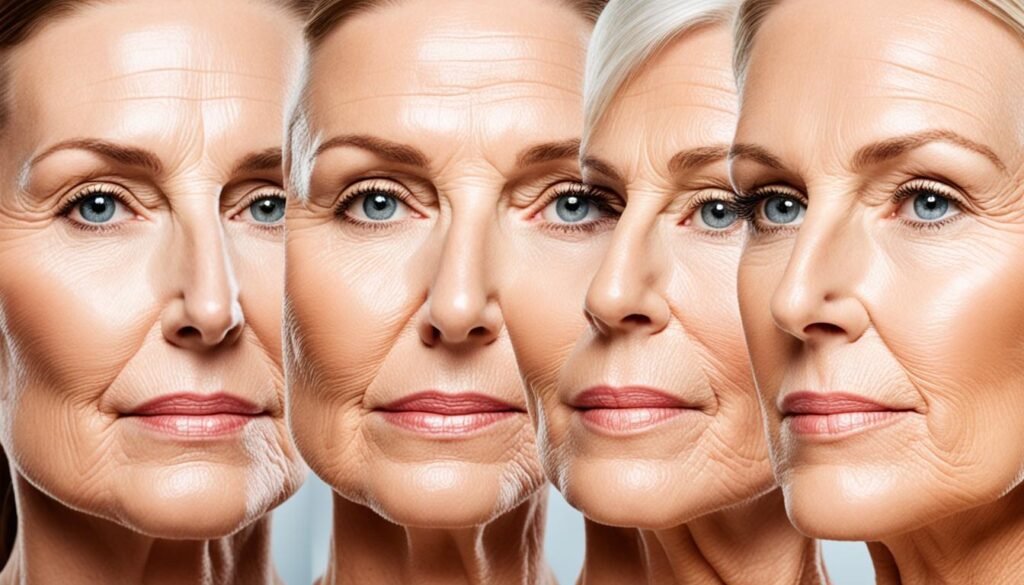
The health and appearance of our skin are largely influenced by collagen, a crucial protein responsible for maintaining its structural integrity. Collagen provides support, elasticity, and firmness to the skin, giving it a youthful and plump appearance. However, excessive alcohol consumption can have detrimental effects on collagen production and lead to its accelerated degradation, contributing to the development of wrinkles, sagging skin, and an overall older-looking complexion.
Alcohol impacts collagen in two significant ways. Firstly, it inhibits collagen synthesis, the process by which new collagen is produced in the body. Research suggests that alcohol interferes with the enzymes responsible for collagen production, resulting in decreased collagen levels in the skin.
Secondly, alcohol-induced collagen depletion occurs due to its ability to break down existing collagen fibers. Excessive alcohol consumption triggers enzyme activity that degrades collagen, leading to its premature breakdown and loss. This degradation weakens the skin’s underlying structure, making it more susceptible to wrinkles and sagging.
Reduced collagen levels and accelerated collagen degradation can have a profound impact on the skin’s appearance. Wrinkles become more prominent, fine lines deepen, and the skin loses its firmness and elasticity. Over time, frequent and heavy alcohol consumption can contribute to the premature aging of the skin, giving it a tired, dull, and aged look.
Limiting alcohol consumption is crucial in preserving collagen levels and maintaining youthful-looking skin. By reducing alcohol intake, individuals can minimize the negative effects on collagen production and protect against its accelerated degradation. Pairing this with a skincare routine that includes collagen-boosting products can further support skin health and delay the signs of aging.
To better understand the impact of alcohol on collagen levels, let’s explore a comparison between collagen production in individuals who consume alcohol moderately and those who consume it excessively:
| Alcohol Consumption | Collagen Production |
|---|---|
| Moderate | Stable and adequate |
| Excessive | Decreased |
The table above illustrates the correlation between alcohol consumption and collagen production. Moderate alcohol consumption maintains stable and adequate collagen levels, while excessive consumption leads to a decrease in collagen production, leaving the skin more vulnerable to aging.
It is crucial to recognize the impact of alcohol on collagen degradation and take steps towards preventing premature skin aging. By understanding the effects of alcohol on collagen production, individuals can make informed choices that support the long-term health and youthfulness of their skin.
Other Effects of Alcohol on the Skin
Alcohol consumption can have diverse negative effects on the skin, extending beyond the previously discussed impacts. Let’s explore some additional consequences of alcohol on the skin:
1. Alcohol and Acne
One of the detrimental effects of alcohol on the skin is its ability to increase oil production, which can lead to acne breakouts. Excessive alcohol consumption disrupts the natural balance of oils in the skin, clogging pores and causing the formation of acne lesions.
2. Alcohol and Blood Vessel Dilation
Alcohol consumption causes the dilation of blood vessels, leading to redness and flushed skin. This visible effect is a result of alcohol’s impact on blood circulation, which can contribute to the appearance of a ruddy complexion in individuals who consume alcohol regularly.
3. Alcohol and Sugar Spikes
Many alcoholic beverages contain high sugar content, which can lead to sudden spikes in insulin levels when consumed. These spikes in blood sugar contribute to the process of glycation, which can lead to the development of aging effects such as facial flushing, saggy skin, and the formation of wrinkles.
4. Alcohol and Dullness of the Skin
Alcohol can dull the skin and interfere with its natural radiance. It reduces the skin’s ability to retain moisture and inhibits its capacity to absorb essential nutrients, leading to a lackluster and dull appearance. Regular alcohol consumption can contribute to a dull complexion and an overall tired look.
5. Alcohol and Skin Disorders
Alcohol consumption can exacerbate or even trigger various skin disorders. Conditions such as flushing, rosacea, psoriasis, and seborrhea can worsen with alcohol consumption, leading to increased redness, inflammation, and discomfort for individuals with these conditions.
| Effect | Description |
|---|---|
| Increased oil production | Alcohol disrupts the natural balance of oils in the skin, leading to the formation of acne. |
| Blood vessel dilation | Alcohol consumption causes blood vessels to dilate, resulting in redness and flushed skin. |
| Spike in insulin levels | Alcoholic beverages with high sugar content can lead to insulin spikes, contributing to aging effects such as facial flushing, saggy skin, and wrinkles. |
| Dullness of the skin | Alcohol dulls the skin and interferes with its ability to absorb vital nutrients, resulting in a lackluster appearance. |
| Skin disorders | Alcohol consumption can worsen or trigger conditions such as flushing, rosacea, psoriasis, and seborrhea. |
The Role of Moderation in Preventing Premature Aging

While alcohol can have significant negative effects on the skin, practicing moderation can help prevent premature aging. Drinking alcohol in moderation or abstaining from it entirely can minimize the damage caused to the skin. Additionally, adopting a healthy lifestyle that includes drinking plenty of water, getting enough sleep, avoiding smoking, protecting the skin from the sun’s UV rays, and maintaining a balanced diet can further support skin health and delay the signs of aging.
Moderation is key when it comes to alcohol consumption and its impact on skin aging. Excessive alcohol intake can lead to dehydration, inflammation, and collagen degradation, all of which contribute to premature aging. By practicing moderation, individuals can reduce the negative effects of alcohol and preserve the health and appearance of their skin.
Drinking alcohol in moderation or abstaining from it entirely can minimize the damage caused to the skin.
One of the primary reasons why moderation is essential is because alcohol can dehydrate the skin. When the body lacks sufficient water, the skin becomes dry, dull, and more prone to wrinkles and sagging. Alcohol-induced dehydration exacerbates these effects, making it crucial to limit alcohol consumption and ensure adequate hydration.
Inflammation is another concern associated with excessive alcohol consumption. Chronic inflammation can lead to long-term damage to the skin, including the development of wrinkles and sagging. By moderating alcohol intake, individuals can reduce inflammation and maintain healthier, more youthful-looking skin.
Collagen is a crucial protein responsible for maintaining the skin’s structure and firmness. Alcohol consumption can significantly impact collagen production and accelerate collagen degradation, leading to the development of wrinkles, sagging skin, and a prematurely aged appearance. By practicing moderation, individuals can help preserve collagen levels and slow down the aging process.
Adopting a healthy lifestyle that goes beyond alcohol moderation is vital for maintaining youthful skin. The choices we make in our daily lives have a significant impact on skin health. Drinking plenty of water helps keep the skin hydrated and supple, while adequate sleep allows the skin to rejuvenate and repair itself. Avoiding smoking prevents the harmful effects of tobacco on the skin, and protecting the skin from the sun’s UV rays helps prevent sun damage and premature aging. A balanced diet filled with fruits, vegetables, and antioxidants provides essential nutrients that support healthy skin.
Benefits of Moderation and Lifestyle Choices
Moderation in alcohol consumption, combined with a healthy lifestyle, offers numerous benefits for skin health. These include:
- Reduced risk of dehydration and dryness
- Lower levels of skin inflammation
- Preservation of collagen levels and skin elasticity
- Improved skin hydration and radiance
- Slower development of wrinkles and sagging skin
- Enhanced skin’s ability to repair and regenerate
- Reduced risk of sun damage and premature aging
By practicing moderation and making conscious lifestyle choices, individuals can significantly impact their skin’s health and appearance. Prioritizing the well-being of the skin through these measures can help prevent premature aging and promote a more youthful complexion.
By practicing moderation and making conscious lifestyle choices, individuals can significantly impact their skin’s health and appearance.
Remember, preventing premature skin aging requires a comprehensive approach that includes moderation in alcohol consumption, staying hydrated, getting enough sleep, avoiding smoking, protecting the skin from the sun, and maintaining a balanced diet. By embracing these practices, individuals can take control of their skin’s health and delay the signs of aging, enjoying a more youthful and radiant appearance for years to come.
Factors that Contribute to Premature Aging
While alcohol is a significant factor contributing to premature aging, there are other lifestyle choices and external factors that can also accelerate skin aging. It is essential to address these factors in addition to minimizing alcohol consumption to maintain youthful and healthy skin.
Effects of Stress on Skin Aging
Stress can take a toll on our skin, contributing to premature aging. When we experience stress, our bodies release hormones like cortisol, which can lead to increased inflammation and free radical damage. Over time, this can result in the breakdown of collagen and elastin, leading to wrinkles and sagging skin. Additionally, stress can disrupt the skin’s barrier function, causing dehydration and a dull complexion. Managing stress through relaxation techniques, exercise, and self-care can help minimize these effects and promote healthier skin.
Effects of Poor Nutrition on Skin Health
Poor nutrition can have a detrimental impact on our skin’s health and appearance. A diet that lacks essential nutrients like vitamins, minerals, and antioxidants can deprive the skin of the necessary building blocks for collagen production and repair. This can contribute to the development of fine lines, wrinkles, and a dull complexion. Additionally, high sugar and processed food intake can lead to increased inflammation and skin damage. Consuming a balanced diet rich in fruits, vegetables, lean proteins, and healthy fats can provide the nutrients needed for vibrant and youthful-looking skin.
Effects of UV Exposure on Skin Aging
Excessive sun exposure is one of the primary external factors that contribute to premature aging. The sun’s harmful UV rays penetrate the skin and damage collagen, elastin, and DNA. This leads to the formation of wrinkles, sunspots, and a loss of skin elasticity. Prolonged sun exposure also increases the risk of developing skin cancer. Protecting the skin from UV rays by wearing broad-spectrum sunscreen, seeking shade, and wearing protective clothing and hats can help prevent photoaging and maintain skin health.
| Factors | Effects on Skin Aging |
|---|---|
| Stress | Increased inflammation, collagen breakdown, wrinkles, sagging skin |
| Poor Nutrition | Lack of essential nutrients, collagen depletion, dull complexion |
| UV Exposure | Collagen and elastin damage, wrinkles, sunspots, increased risk of skin cancer |
By addressing these factors alongside minimizing alcohol consumption, we can make significant strides in preventing premature aging and maintaining youthful and healthy skin.
Tips for Preventing Premature Aging
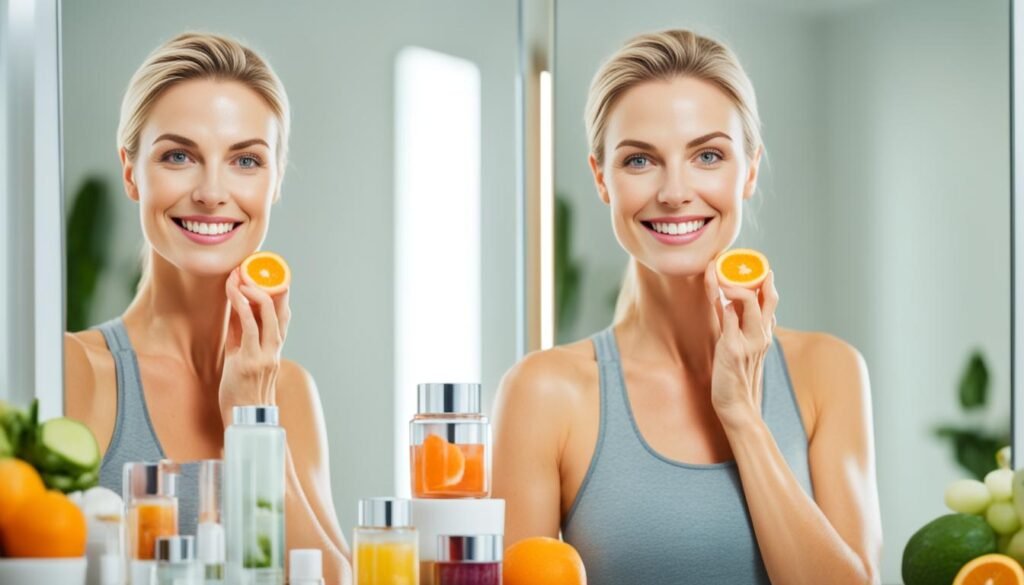
Besides reducing alcohol consumption, there are several tips to prevent premature aging and maintain youthful skin. By adopting healthy lifestyle choices, individuals can significantly improve their skin health and reduce the visible signs of aging.
1. Hydrate with Water
Drinking plenty of water is essential for maintaining hydrated and healthy skin. Hydration helps keep the skin plump, smooth, and prevents dryness and the appearance of wrinkles. Aim to drink at least 8 glasses of water per day to ensure your skin remains moisturized from within.
2. Get Sufficient Sleep
Adequate sleep plays a vital role in skin health and preventing premature aging. During sleep, the body repairs and regenerates skin cells, leading to a refreshed and rejuvenated complexion. Aim for 7-8 hours of quality sleep each night to support your skin’s natural healing process.
3. Avoid Smoking
Smoking is detrimental to skin health and accelerates the aging process. It leads to the breakdown of collagen and elastin, causing wrinkles, sagging skin, and a dull complexion. Quitting smoking can help minimize these effects and promote a more youthful appearance.
4. Protect Your Skin from UV Rays
Excessive sun exposure is a major contributor to premature aging and skin damage. Always protect your skin by applying sunscreen with a high SPF, wearing protective clothing, and seeking shade during peak sun hours. This safeguards your skin from harmful UV rays, reducing the risk of wrinkles, sunspots, and skin cancer.
5. Maintain a Balanced Diet
Achieving healthy and youthful skin starts from within. A balanced diet rich in fruits, vegetables, lean proteins, and healthy fats provides essential nutrients and antioxidants that support the skin’s natural rejuvenation process. Incorporate foods like berries, leafy greens, fish, and nuts into your meals for optimal skin health.
By following these tips and making conscious decisions to prioritize your skin health, you can minimize the effects of premature aging and maintain a youthful, vibrant complexion.
Conclusion
Alcohol’s impact on antiaging skin care is undeniable. The negative effects of alcohol on the skin, such as dehydration, inflammation, and collagen degradation, can contribute to premature aging and the development of wrinkles, sagging skin, and other signs of aging.
However, there are steps individuals can take to maintain youthful and healthy skin. Practicing moderation when it comes to alcohol consumption is key. By minimizing alcohol intake and adopting a healthy lifestyle, such as staying hydrated, getting enough sleep, and protecting the skin from UV rays, individuals can mitigate the detrimental effects of alcohol and prevent premature aging.
It is crucial to prioritize skin health by incorporating beneficial habits and making informed choices. By doing so, individuals can maintain the skin’s natural glow, preserve its youthful appearance, and enjoy the benefits of a vibrant and healthy complexion for years to come.
FAQ
How does alcohol impact the skin’s aging process?
Alcohol consumption can contribute to skin aging by causing dehydration, inflammation, collagen degradation, and other detrimental effects.
What are the effects of alcohol on the skin?
Alcohol can lead to dehydration, inflammation, increased oil production, blood vessel dilation, and dullness of the skin.
Can alcohol consumption cause dehydration?
Yes, alcohol inhibits the absorption of water into the cells, leading to dehydration and dryness of the skin.
How does alcohol-induced inflammation affect the skin?
Alcohol-induced inflammation can result in redness, flushing, and over time, the development of wrinkles and sagging skin.
Does alcohol affect collagen production?
Yes, alcohol consumption can decrease collagen production and accelerate collagen degradation, leading to the development of wrinkles and sagging skin.
Are there any other negative effects of alcohol on the skin?
Yes, alcohol can increase oil production, cause blood vessel dilation, spike insulin levels due to high sugar content, dull the skin, and worsen or cause skin disorders.
Can practicing moderation help prevent premature skin aging?
Yes, minimizing alcohol consumption and adopting a healthy lifestyle can help prevent premature skin aging and preserve a youthful appearance.
What other factors contribute to premature aging besides alcohol consumption?
Factors such as stress, poor nutrition, lack of sleep, excessive UV exposure, and smoking can also accelerate skin aging.
What are some tips for preventing premature aging?
To prevent premature aging, individuals should drink plenty of water, get enough sleep, avoid smoking, protect their skin from the sun’s UV rays, and maintain a balanced diet.
How can I maintain youthful and healthy skin?
By minimizing alcohol consumption, practicing moderation, and implementing habits like drinking water, getting enough sleep, and protecting the skin from external factors, you can help maintain youthful and healthy skin.

